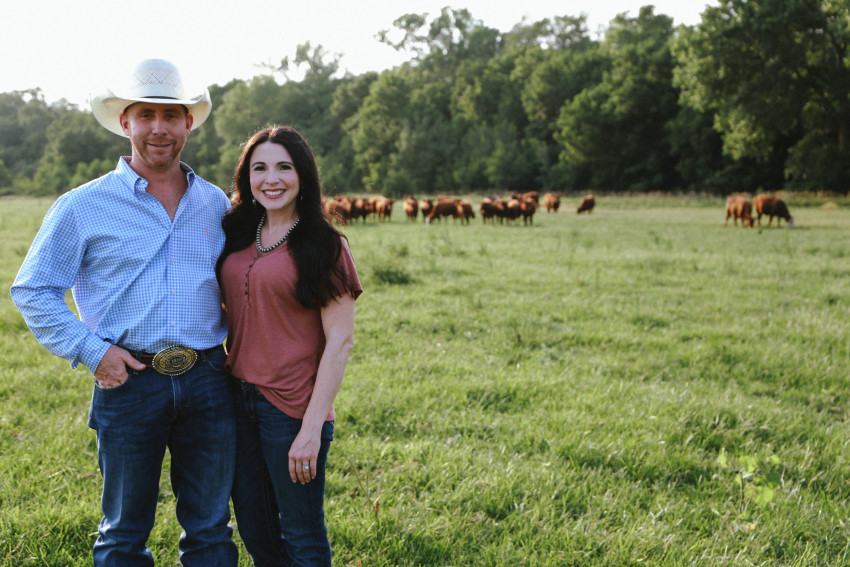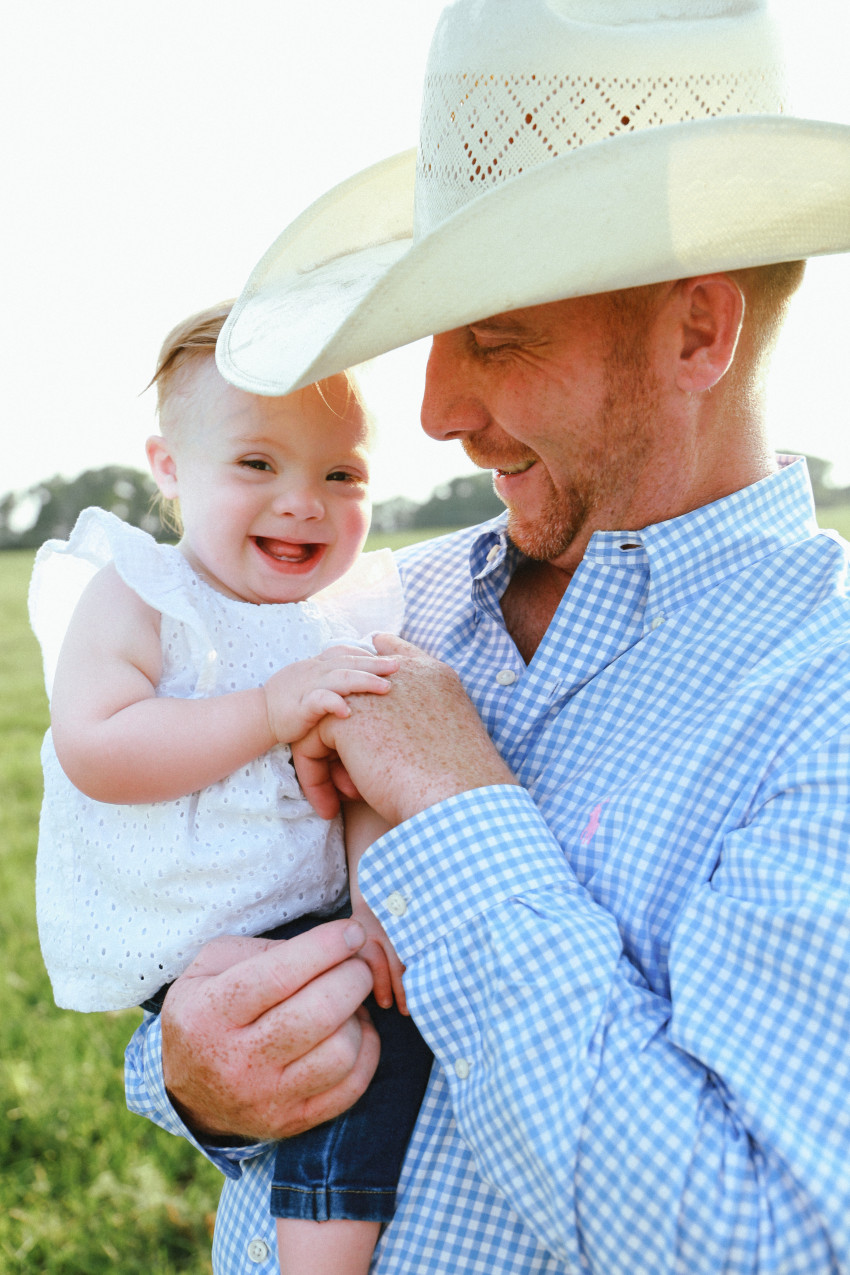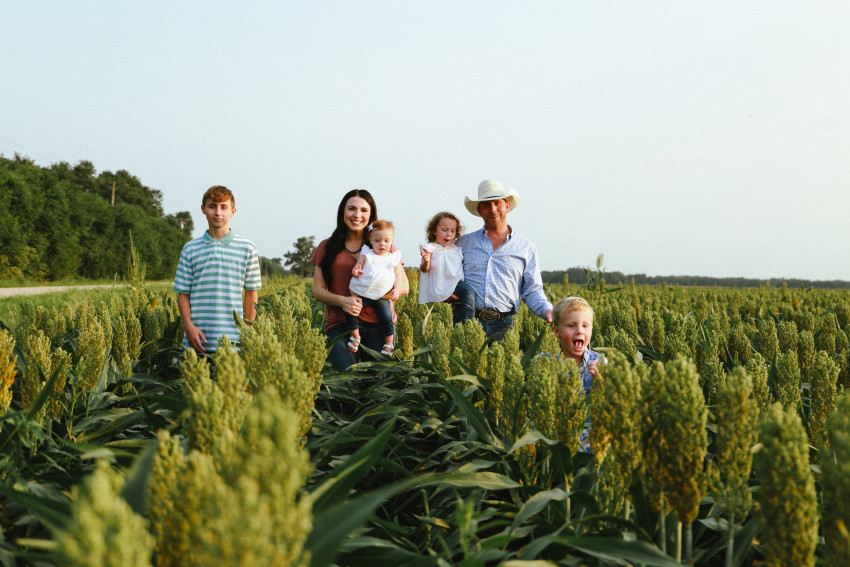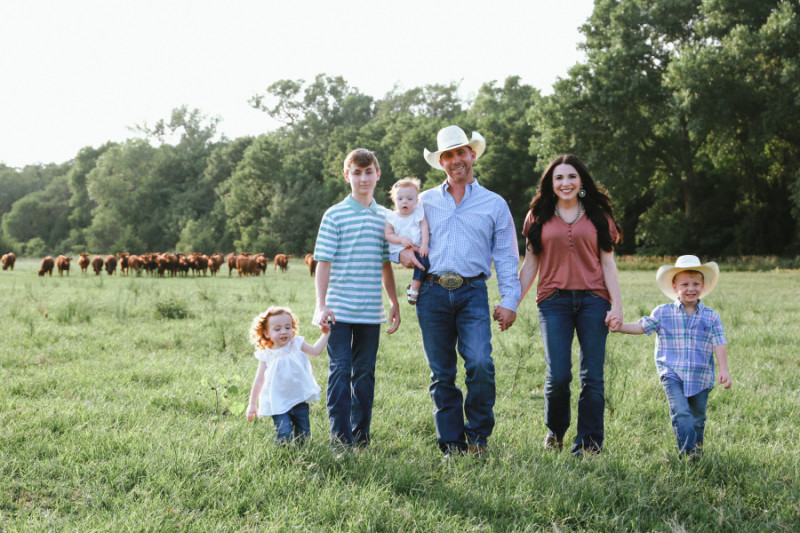By Kansas Living on August 1, 2022
Get to know the Mueller Ranch Family
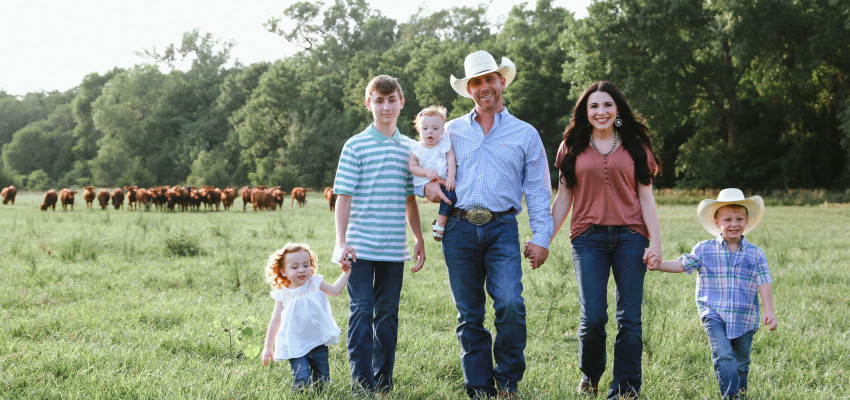
We caught up with Macey Mueller, a busy ranch wife and mom, and asked her to share about her family and farm operation. Here's what she shared!
My husband, Josh, is a fourth-generation farmer and rancher in Halstead. Together with our four kids — Conway, Raleigh, GG and Coral — we grow wheat, milo, corn, soybeans and hay. We also raise Red Angus cattle and operate custom backgrounding and livestock marketing businesses. Backgrounding is a system where cattle are on pastures and forages from the time they’re weaned until they go to a feedlot.
1) What three things matter most to you as a rancher?
First and foremost, we’re committed to caring for the livestock and the land as we produce safe and wholesome food that ends up on our table and in the grocery store. We continuously monitor animal health and nutrition and regularly evaluate plant and soil health to be efficient stewards of our resources.
As a diversified operation, we’re also focused on integrating our practices to maximize those resources. For example, we often plant wheat in the fall, then graze cattle on it throughout winter when other grass is dormant. We pull the cattle off in the spring and allow the wheat to mature until we harvest the grain in June. We can use the same piece of ground to raise the burger and the bun!
We combine these different management tools with innovative technology and a longstanding family legacy to sustain our operation — both environmentally and economically — for future generations, which is our
ultimate goal.
2) What is the hardest and best part of your job as a rancher?
Working as a family is both the best and hardest part of our job. Josh and I are blessed to work with our dads in different aspects of our businesses, and we all bring unique skill sets — and unique opinions — to the table. We also appreciate the opportunity to include our kids in many of our day-to-day responsibilities and especially enjoy special moments like seeing three generations working together in the field or visiting at the sale barn.
3) What does sustainability mean to you?
We’re currently raising the fifth generation of farmers and ranchers on some of the same land Josh’s great-grandparents originally cared for, and we don’t take that responsibility lightly. Sustainability comes down to doing the right thing for our land, our livestock and our family. Advanced production practices and innovative technology allow us to produce more food with less reliance on inputs like pesticides, which is ultimately better for the environment and for our bottom line, and we really need both to sustain our operation.
4) Where do you see the future of your operation going?
We continue to look for ways to expand and diversify without burning ourselves out. We always joke that we’re pretty good at picking up something new but not so great at letting go of business ventures. Our long-term goal is to offer our children an opportunity to return home and be part of our farming and ranching operation, and that drives us to grow at a sustainable rate.
5) What is your favorite way to prepare beef?
Beef is a staple on our table, with many delicious and nutrient-dense options in the rotation. Personally, we love to cook tri-tip. It’s large like a roast but cooks and tastes like steak, so it’s a great way to entertain or feed a family. We rub ours liberally with coarse salt, black pepper, a little soy sauce and some minced thyme and then cook it at a high heat on the grill for about 20 minutes (flipping halfway through). We love it medium rare, so I always use a meat thermometer and pull it off the heat at around 120-125 F. I then let it rest for 10-15 minutes (it will continue to cook some in the process) before slicing against the grain. It also makes great leftovers for tacos, stir-fries or salads.
6) What’s a typical day/week/month look like for you?
As a Type-A farmwife who loves a good routine, this question gives me a little anxiety. Our responsibilities and workload with cattle and crops change almost daily depending on the season, the market, what the weather is doing and what our kids have going on. “Typical” is not a commonly used term around here, but “flexibility” certainly is.
7) What’s one thing you’ve changed on your ranch since you started?
Josh has been an order buyer, or someone who helps other cattle men and women strategically market and purchase animals based on the individual’s goals, for nearly 20 years and used to travel to several different sales each week to buy cattle for his customers.
In 2019, we switched gears a bit and bought our own sale barn, El Dorado Livestock Auction. It has been a good change, as it allows us to work together on sale day and gives Josh a chance to grow his cattle marketing business in a different way. It has also given us opportunities to connect with more area ranchers and support the local communities.
8) What is one thing you wish consumers knew about your ranch?
My mom has always said, “If it was easy, everyone would do it,” and I think that especially rings true for farming. Raising food, fuel and fiber requires a lot of time, money, sweat and stress, but it can also be a very fulfilling and rewarding lifestyle if you have a passion for it like we do.
9) What’s a question you have for consumers?
Are you ever confused by food labels like I am? As a mom, I am obviously concerned about what my kids eat, but I believe scientific research has proven modern production practices like GMOs and hormones are safe. All meat is “antibiotic-free,” and alternative meat products are not as healthy as they’d like you to believe. Yet, when I walk through the grocery store aisles, I am surrounded by misleading health claims and marketing tactics. It can be a confusing experience, and I am curious to know how consumers are navigating it.
10) What would you do if you weren’t a rancher?
We can’t imagine a life without crops and cattle, but when we’re not farming and ranching together, we are usually cooking and eating together. I’d like to think we’d still be somehow involved in sharing our love of food and family.

